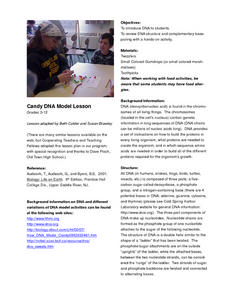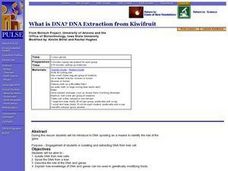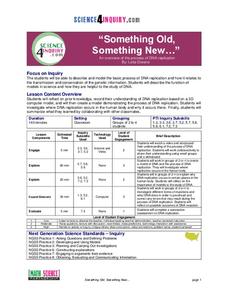Curated OER
Strawberry Smoothies
Biologists extract the DNA from a strawberry. After completing the procedure, learners write answers to a few questions on the lab sheet provided. This is ideal lab practice during a DNA unit in your general biology course.
Curated OER
DNA in a "Snap"
Students observe a model of DNA and answer probing questions like, "What does this model represent?" They then work in small groups to construct an accurate model of DNA per rubric provided and present to the class explaining their model...
Curated OER
Dna in the Garden - Where It All Began
In this DNA activity, students read about Gregor Mendel and his experiments with plants and DNA. Students complete a crossword puzzle using 10 vocabulary words from the selection.
Curated OER
DNA AND BLOOD TYPING
Students list three descriptive characteristics and three functions of DNA, describe two ways that genetics is important in a forensic investigation, and list the four major human blood types.
Towson University
Case of the Crown Jewels
Can your biology class crack the Case of the Crown Jewels? Junior forensics experts try their hands at DNA restriction analysis in an exciting lab activity. The lesson introduces the concept of restriction analysis, teaches pipetting and...
Towson University
The Wildlife Forensics Lab
Can science put an end to the poaching of endangered species? Show your young forensic experts how biotechnology can help save wildlife through an exciting electrophoresis lab. Grouped pupils analyze shark DNA to determine if it came...
Curated OER
DNA Fingerprinting: You Be the Judge!
Learners explore DNA fingerprinting. Students discover how DNA fingerprinting is done and judge the validity. They evaluate the use of certain prints in courts and address the ethics of establishing a national database of fingerprpints.
Curated OER
Life Science: DNA Whodunit?
Students role play an honorary detective to assist in solving a crime committed. They investigate by a bank robbery and interview eyewitnesses using their Crime Investigation Notebook and clues from an eyewitness account from the...
Curated OER
DNA Fingerprinting: You Be the Judge!
Students use their knowledge of DNA fingerprinting to evaluate the use fingerprints in courts, and will address the ethics of establishing a national database of fingerprints.
Curated OER
Candy DNA Model Lesson
Young scholars explore DNA structure using materials such as Twizzlers, small colored gumdrops and/or toothpicks.
Curated OER
Recombinant DNA to Protect Crops
Students read an article about manipulation of plant DNA. After reading the short article, they work in small groups to respond to the provided discussion questions and explain their answer to the class.
Curated OER
Extract Your Own DNA from Cheek Cells
Students observe their own DNA. For this DNA lesson, students learn the simple method of DNA extraction and explain why DNA extraction is important to scientists.
Curated OER
Strawberry DNA extraction
Students study the basic function of DNA and then extract it from strawberries. In this DNA extraction lesson students examine DNA and see why the extraction of it is so important to scientists.
Curated OER
What is DNA? DNA Extraction from Kiwifruit
Students isolate DNA from kiwi cells, spool DNA from a kiwi, describe role of the DNA and genes, and explain how knowledge of DNA and genes can be used in genetically modifying foods.
Curated OER
The Structure of DNA
Students will demonstrate knowledge of the structure of DNA by constructing simple models of DNA with materials given to them in class. They will also discover that some female scientists such as Rosalind Franklin have not been given...
Curated OER
The Case of Regulation in Cells
After your biologists have learned about transcription, translation, and gene regulation, they work in a small group to create a poster of a system that serves as an analogy of the gene regulation process. They share their creations with...
Beyond Benign
Who’s Your Daddy? Finding the Father
Time for the reveal! The nineth lesson plan of the series of 18 has scholars compare DNA fingerprints of cats to their samples to identify the father of Sparky's kittens from previous lessons. They analyze the DNA bands to determine the...
Howard Hughes Medical Institute
Lactose Intolerance: Fact or Fiction
Around the world, about 2/3 of adult humans are lactose intolerant. Scholars work in small groups to discuss a few statements about lactose intolerance. Then, they watch a video on the topic and readdress each statement. Whole-class...
Science 4 Inquiry
"Something Old, Something New..."
Young scientists learn about DNA replication through a video and model creation. They answer analysis questions before exploring the role of mutations and then complete a summative assessment.
LABScI
Taxonomy: Who is in My family?
Find similarities in seemingly unlike organisms. The second instructional activity in a series of 12 builds the concept of a taxonomy and explores the use of a dichotomous key. Learners begin in part one by attempting to group a set of...
Agriculture in the Classroom
"Steer" Toward STEM: Careers in Animal Agriculture
Think like an engineer and an agricultural scientist over the course of 12 lessons in a STEM based unit. Young scientists take on the roles of animal physiologists, animal geneticists, agricultural engineers, animal nutritionists,...
Curated OER
Games and Activities to Teach Molecular Genetics
High schoolers demonstrate a working knowledge of cell interactions such as DNA replication, protein synthesis (transcription and translation), through active participation in a cooperative group.
Curated OER
Cracking the Genetic Code
Students investigate different purposes for manipulating DNA. After reviewing the structure and functions of DNA, students explore topics related to the use or manipulation of DNA and the potential benefits and problems, later making a...
Curated OER
Standard 4 Review Sheet-Key Ideas Biology-The Living Environment
In this living environment worksheet, learners answer a variety of questions about living organisms, the processes they go through to make food and break down food, absorb nutrients, and release toxins. They explain homeostasis, they...

























